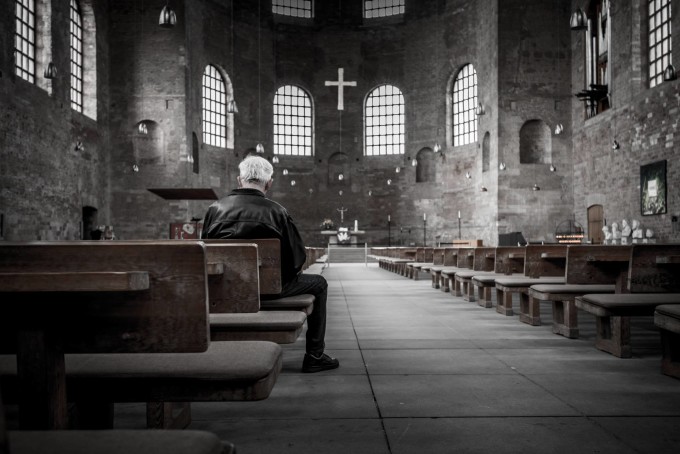back to journal

A Year Through the Gospels: Week 15 – Betraying Jesus
April 16, 2016
Darryl Sluka
This is the fifteenth installment in a yearlong series. You can find the previous installments here.
Mark 14:26–31, 50 Jesus Foretells of Peter’s Denial
“And when they had sung a hymn, they went out to the Mount of Olives. And Jesus said to them, “You will all fall away, for it is written, ‘I will strike the shepherd, and the sheep will be scattered.’ But after I am raised up, I will go before you to Galilee.” Peter said to him, “Even though they all fall away, I will not.” And Jesus said to him, “Truly, I tell you, this very night, before the rooster crows twice, you will deny me three times.” But he said emphatically, “If I must die with you, I will not deny you.” And they all said the same… And they all left him and fled.”
We often look down on the disciples while they were with Jesus. They did not understand his teachings; they quickly forgot the power of his miracles; they lacked faith; they wanted Jesus to do things he did not come to do. Ultimately, it is very easy to read through the gospels and view the disciples as incompetent or halfwitted. One of the worst marks on their record is the night Jesus was betrayed and arrested. Prior to the arrest at the Mount of Olives, Peter and the rest of the disciples declared their loyalty to Jesus and that they would stay with him no matter what, even unto death. Sadly, though, verse fifty reveals that not one of the disciples stayed true to his word but instead deserted him. As dark and cowardly as this scene is, it was actually necessary for two reasons.
The first reason is because of Zechariah’s prophecy. Jesus quotes Zechariah 13:7 when telling his disciples that they will flee from him: ““Awake, O sword, against my shepherd, against the man who stands next to me,” declares the Lord of hosts. “Strike the shepherd, and the sheep will be scattered; I will turn my hand against the little ones.” Zechariah was a prophet and priest while Israel was rebuilding its nation after the Babylonian exile. God revealed many things about the coming Messiah for him to prophesy about and encourage his people. In the book of Zechariah, the last few chapters describe how the future Kingdom of God will be ushered in. After verse seven it goes on to say
“In the whole land, declares the Lord, two thirds shall be cut off and perish, and one third shall be left alive. And I will put this third into the fire, and refine them as one refines silver, and test them as gold is tested. They will call upon my name, and I will answer them. I will say, ‘They are my people’; and they will say, ‘The Lord is my God.’”” (Zechariah 13:8–9)
God declares that he will make a group of people his as a result of everything he is doing. By quoting this passage, Jesus indicates that the whole process is in motion and that the first part of the Messiah’s role is being carried out. If this part of the prophecy by Zechariah is not fulfilled, then the rest of it would not come to fruition either. The Shepherd must be struck and the sheep scattered so that the sheep may be called back to God for his purposes.
The second reason is for the sake of the sake of the gospel and the Church. The twelve disciples who were with Jesus on the night of his arrest were his most faithful disciples. They followed him for three years, listening to his teaching and watching his miracles. After his death, they were some of the few who were eyewitnesses of his resurrection. During his ministry, Jesus named them apostles (Luke 6:13), and he appointed them to preach the gospel before his ascension (Matthew 28:18-20). In Acts 1:8, Jesus says “you will be my witnesses in Jerusalem, in all Judea and Samaria, and to the end of the earth.” These twelve apostles were his most qualified witnesses, and it was necessary for them to spread the good news of Jesus. Had they fulfilled their vows to stay with Jesus unto death, who would have proclaimed the name of Jesus after his ascension? But the evangelism of the Mediterranean world not have been the only thing to struggle. There would be no one available to guide the body of new believers. The Church might never have gotten off the ground. The apostles were the appointed leaders of Christ’s Bride, the Church. Without them, the whole operation would flounder and struggle to ever become what Zechariah prophesied it would be. The book of Acts would not have happened, and no one would have been around to correct incorrect teachings to ensure the Church’s beliefs remained rooted in what Christ taught. The death of the apostles on the night of Jesus’ betrayal might have resulted in the death of the Christian faith.
The disciples certainly missed a lot while they were with Jesus, but the fact that they fulfilled Zechariah’s prophecy instead of their vows to Jesus on the night of his arrest was one of the most pivotal moments in God’s plan for restoration. The Church is the fulfillment of Zechariah’s prophecy about God and his people, and the Church is the result of the disciples’ decision to flee instead of to die.